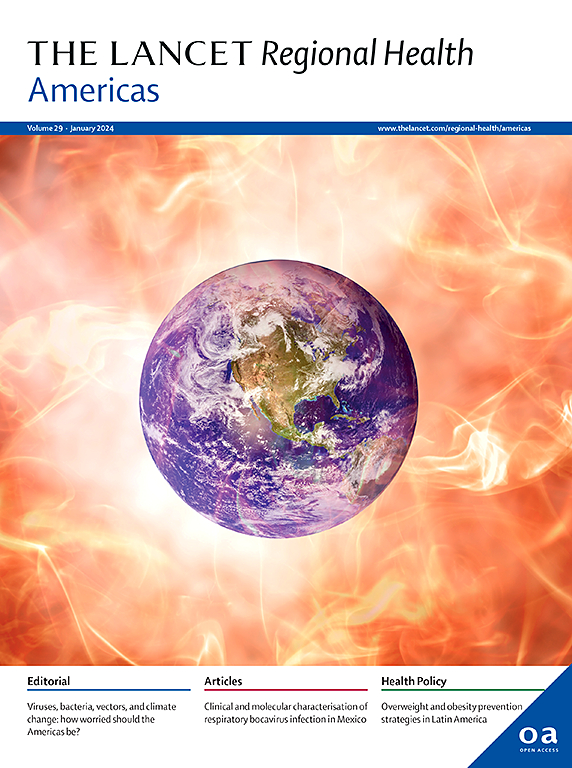与巴西儿童和青少年药物敏感性结核病患者不利治疗结果相关的社会和健康因素:全国回顾性队列研究
IF 7
Q1 HEALTH CARE SCIENCES & SERVICES
引用次数: 0
摘要
背景虽然结核病(TB)对全球儿童和青少年的健康构成了严重威胁,但有关这一群体结核病治疗结果相关因素的信息却很有限。本研究调查了与巴西这个结核病高负担国家的儿童和青少年结核病不利治疗结果相关的社会和健康因素。方法我们对2001年1月1日至2022年12月31日期间向全国通知系统(Sinan)通报的巴西儿童(0-9岁)和青少年(10-17岁)结核病患者进行了一项基于人群的全国回顾性队列研究。不利的治疗结果被定义为失去随访、治疗失败和死亡。逻辑回归模型和多项式模型分别研究了社会和健康因素、总体不利治疗结果、失去随访和死亡之间的关联。研究结果共纳入了88270名结核病儿童和青少年患者,其中25600人(30.6%)在医护人员监督下接受了直接观察治疗(DOT)。其中,9303 人(10.5%)的结核病治疗效果不佳。对于儿童来说,HIV 感染(调整后的比值比为 2.4,95% 置信区间为 1.9-3.1)和未接受 DOT(2.3,1.9-2.7)与不利的治疗结果有关。就青少年而言,饮酒(1.6,1.2-2.0)、使用非法药物(4.2,3.4-5.1)、吸烟(1.6,1.3-2.1)、感染艾滋病毒(2.7,2.2-3.4)和未接受短期直接治疗(2.6,2.3-2.9)与结核病治疗结果不理想有关。在巴西,结核病治疗成功率与世界卫生组织终结结核病战略目标(90%)相当。药物使用、艾滋病毒感染和缺乏监督治疗是导致治疗效果不佳的主要因素。应评估改善这一弱势群体结核病治疗结果公平性的策略,包括艾滋病-结核病综合服务、医疗机构或社区的短期直接治疗以及以人为本的整体医疗和社会保护。本文章由计算机程序翻译,如有差异,请以英文原文为准。
Social and health factors associated with unfavourable treatment outcomes in children and adolescents with drug-sensitive tuberculosis in Brazil: a national retrospective cohort study
Background
Although tuberculosis (TB) poses a significant global health threat to children and adolescents, there is limited information on the factors associated with TB treatment outcomes in this group. This study investigated the social and health factors associated with unfavourable treatment outcomes in children and adolescents with TB in Brazil, a high TB burden country.
Methods
We conducted a population-based national retrospective cohort study of children (0–9 years) and adolescents (10–17 years) with TB in Brazil notified to the national Sistema de Informação de Agravos de Notificação (Sinan) from Jan 1, 2001, to Dec 31, 2022. Unfavourable treatment outcomes were defined as loss to follow-up, treatment failure, and death. Logistic regression and multinomial models examined the association between social and health factors, unfavourable treatment outcomes overall, and loss to follow-up and death, respectively.
Findings
A total of 88,270 children and adolescents with TB were included of whom 25,600 (30.6%) had healthcare worker-supervised directly observed therapy (DOT). Of these, 9303 (10.5%) individuals experienced unfavourable TB treatment outcomes. For children, HIV infection (adjusted Odds Ratio 2.4, 95% confidence interval 1.9–3.1) and did not receive DOT (2.3, 1.9–2.7) were associated with unfavourable treatment outcomes. For adolescents, alcohol use (1.6, 1.2–2.0), illicit drug use (4.2, 3.4–5.1), tobacco use (1.6, 1.3–2.1), HIV infection (2.7, 2.2–3.4), and not receiving DOT (2.6, 2.3–2.9) were associated with unfavourable TB treatment outcome. Receiving social protection through government cash transfers protected against death (0.5, 0.3–0.9).
Interpretation
In Brazil, TB treatment success rates were comparable to WHO End TB Strategy targets (90%). Substance use, HIV infection, and the absence of supervised treatment were the main factors associated with unfavourable treatment outcomes. Strategies to improve equity of TB treatment outcomes in this vulnerable group, including integrated HIV-TB services, DOT in healthcare facilities or communities, and holistic, person-centred healthcare and social protection, should be evaluated.
Funding
Department of Health and Social Care (DHSC), the Foreign, Commonwealth & Development Office (FCDO), the Medical Research Council (MRC) and Wellcome, UK.
求助全文
通过发布文献求助,成功后即可免费获取论文全文。
去求助
来源期刊

Lancet Regional Health-Americas
Multiple-
CiteScore
8.00
自引率
0.00%
发文量
0
期刊介绍:
The Lancet Regional Health – Americas, an open-access journal, contributes to The Lancet's global initiative by focusing on health-care quality and access in the Americas. It aims to advance clinical practice and health policy in the region, promoting better health outcomes. The journal publishes high-quality original research advocating change or shedding light on clinical practice and health policy. It welcomes submissions on various regional health topics, including infectious diseases, non-communicable diseases, child and adolescent health, maternal and reproductive health, emergency care, health policy, and health equity.
 求助内容:
求助内容: 应助结果提醒方式:
应助结果提醒方式:


